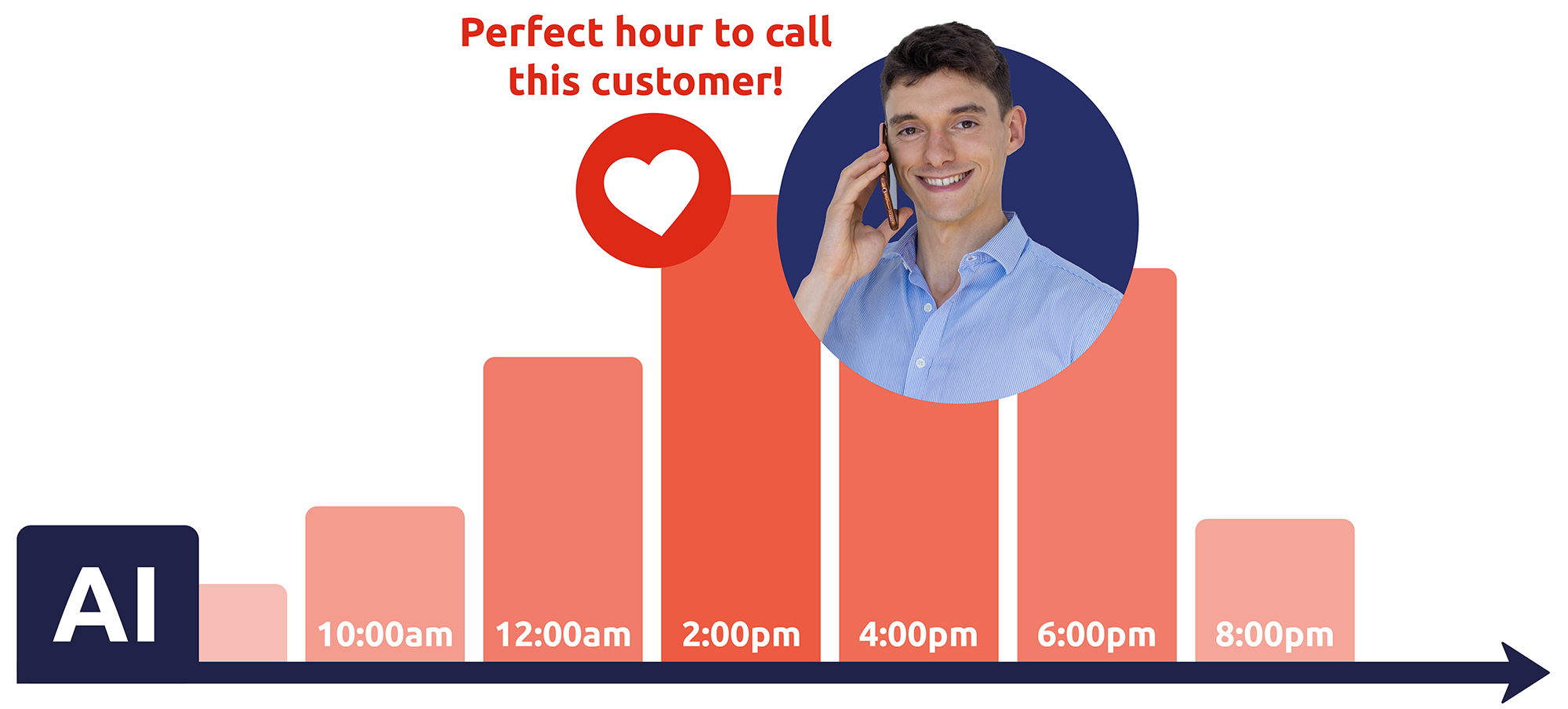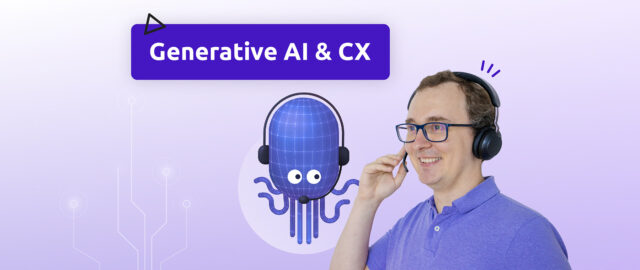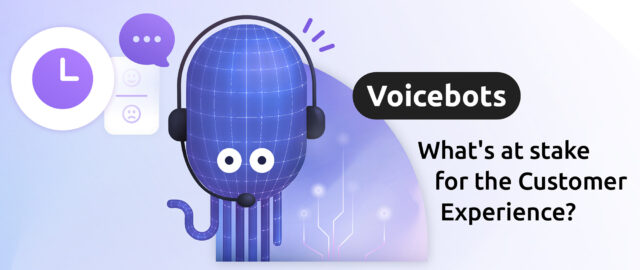The benefits of AI before customer interaction
You might think that AI is only useful from the moment the customer comes into contact with the representative, but this is far from reality, thanks to the advances in artificial intelligence in customer relations. AI has its place at every stage of the customer journey.
The first step in improving the customer experience with AI begins long before the initial contact when customers are segmented based on data collected in the company’s CRM.
AI now makes it possible to anticipate an interaction to respond in the best possible way when it occurs, or to guard against it with preventive customer satisfaction improvement strategies.
AI for better data segmentation
AI improves the customer experience by optimizing various aspects of the processing workflow. In the early stages, it enables advanced segmentation through CRM data analysis, identifying patterns and trends that may escape the human eye. This facilitates the creation of customer segments based on behavior, preferences, and purchase histories. Instead of relying on traditional segmentation, which can be complex and energy-consuming, AI develops dynamic segments that adapt to customers’ fluctuating behaviors and preferences, while also having the ability to detect emerging patterns or trends, making it possible to target previously unexplored market segments.
How can AI better identify customer types?
By meticulously scrutinizing the data at its disposal, Artificial Intelligence (AI) can extrapolate a customer’s distinctive consumer trends. This valuable analysis enables refined adaptation of various elements: the posture adopted, the content of the speech, or even the judicious selection of a specific telephonist. By providing an in-depth examination of consumer habits, AI has become a predictive tool of choice, capable of accurately anticipating potential customer dissatisfaction and working to improve the customer experience.
Artificial intelligence applied to customer relations offers companies an invaluable opportunity to adopt an approach to customer relations that is both initiating and proactive. This effectively prevents churn. For example, Diabolocom’s AI solution reduces the churn rate by 12%.
Artificial intelligence represents the cornerstone of the next essential phase in customer journey optimization: the sharp, judicious personalization of offers.
How can AI personalize offers?
Thanks to the information available to AI, tailor-made offers are created so that each customer receives recommendations tailored to his or her needs. This meticulous process aims to enhance the customer experience, making it not only memorable but also satisfying. In this dynamic, a tailor-made and perfectly adapted offer proves to be a powerful lever for increasing conversion. Every proposal, far from being coincidental, is transformed into a golden opportunity, maximizing the chances of immediate customer buy-in.
How can AI help you contact customers at the right time?
Artificial intelligence (AI), coupled with Diabolocom solutions, complies with the strict rules set by regional regulators for telephone canvassing. It uses predictive analysis to identify the best time to contact a customer by analyzing their responses to previous solicitations. This approach, based on the customer’s history, preferences, and ideal timing, enables the conversation to be initiated positively and legitimately. As a result, the customer is more receptive, the user experience is enhanced and the chances of successful communication between company and customer are increased, all within a framework more respectful of new regulatory constraints.

AI for better understanding of customers
Churn prevention
Artificial intelligence (AI) is a powerful tool for reducing churn, thanks to an in-depth understanding of customers. By analyzing large quantities of customer data, AI identifies behavioral patterns and early signals of disengagement. This information, subtle and complex to detect manually, enables companies to anticipate customer dissatisfaction before they decide to leave. For example, changes in the frequency of product use, or repeated negative interactions with customer service can be telling clues. With these valuable insights, companies can take proactive measures, such as adjusting offers, offering targeted discounts, or improving customer service, to retain unhappy customers and thus minimize churn. In short, thanks to AI, companies can build stronger, more personalized relationships with their customers, resulting in increased loyalty.
The right offer at the right time
By carefully scrutinizing consumer history and behavior, artificial intelligence (AI) demonstrates its ability to accurately anticipate needs. It analyzes and interprets data intuitively, detecting buying motives, transaction frequency, and even periods of intense activity or latency. From this wealth of information, AI extracts crucial clues about customers’ preferences and expectations, enabling personalized offers to be made. Customers are then presented with propositions that are not only attractive but above all perfectly aligned with their implicit or explicit needs and desires, reinforcing their perception of value and relevance. This refined approach significantly increases the chances of conversion, as customers are more inclined to respond positively to offers that resonate with their personal needs and aspirations. Ultimately, AI proves to be an indispensable ally in forging tailor-made offers that are irresistible to consumers.
Thanks to the information provided by AI, the teleconsultant adjusts his or her posture, metamorphosing into an informed and appreciated prescriber. Armed with relevant knowledge of the customer’s needs, derived from careful analysis of their trends and habits, the call center advisor can provide recommendations that resonate with the customer, consolidating the relationship and trust between the two parties.
Tailor treatment for a better customer experience with AI
Thanks to artificial intelligence (AI), a more personalized customer approach is possible, by adopting the best posture during each customer interaction. AI efficiently analyzes customer calls using advanced technologies, such as call pattern recognition. These technologies enable us to quickly and accurately identify why customers are calling. By converting speech into text and recognizing call patterns, AI for customer relations offers a deep understanding of interaction, providing crucial information that guides call center advisors on how best to meet the specific needs of each caller.
Identify call patterns by scenario
Artificial intelligence (AI) is proving an invaluable tool in the efficient handling of customer calls, thanks to its ability to precisely analyze incoming data from the IVR or Voicebot. As soon as a call is received, AI activates to scrutinize and interpret the information transmitted, relying on in-depth scenario analysis to clairvoyantly determine the underlying reason for the call. This technique involves examining dialogue patterns and comparing voice inputs with a database of known, pre-established scenarios, to identify patterns and trends. This agile process drastically reduces the time needed to resolve problems or queries raised by customers. By promptly discerning the nature of each call, AI enables customer advisors to provide targeted, relevant responses without delay, avoiding delays and misunderstandings that could hinder customer satisfaction.
Add the right skills for better routing (SBR)
Integrating Artificial Intelligence (AI) into the call routing process is essential to ensure that customers are efficiently directed to the agent or service best suited to their specific needs. This system, called Skills-Based Routing (SBR), optimizes the distribution of incoming calls. By quickly identifying the nature of the customer’s request, AI, thanks to SBR, directs the call to the person with the skills and expertise required to deal with the problem or question posed. This not only minimizes waiting time for the customer, but also eliminates the need for them to call back and navigate through different numbers or services. SBR, supported by AI, dramatically increases the efficiency and fluidity of customer service, delivering an enhanced customer experience.
While AI has many benefits upstream of a telephone conversation with a customer, it is also very useful during customer interaction.

AI to enhance the customer experience during interaction
AI unlocks unprecedented opportunities for companies wishing to deepen their understanding and proactively respond to specific customer requirements. It does this by maximizing the efficiency of advisors during active exchange with customers, and agilely taking on routine, monotonous tasks. Its integration into exchange processes offers a range of tangible and substantial benefits, optimizing the customer experience.
Call transcription
Modern speech recognition systems play a pivotal role in instant call transcription, working to convert voice communications into written text. By scanning the transcribed words and phrases, AI identifies the motives, concerns, or requests expressed by the customer during the call. This fine, structured analysis enables the AI to understand exactly the specific problem or query the customer wishes to address.
This transcription functionality benefits both the advisor and the customer. The advisor is more efficient and spends less time on the call, and the customer no longer needs to repeat himself.
Call pattern recognition and context understanding
Artificial intelligence (AI) understands the context of customer interactions, learns from each past conversation, and measures satisfaction. Through in-depth voice and language analysis, AI can decipher subtle nuances. By examining keywords and expressions used, it determines the caller’s mood and intention, providing crucial clues about the overall context of the call. In addition, AI can access and analyze historical data from previous interactions with the caller, providing a complete backdrop and in-depth understanding of the specific context. This ability to identify context enables call center advisors or automated response systems to tailor their communication and responses to effectively and appropriately address customer needs and expectations. Today, Diabolocom uses artificial intelligence to reduce customer context-taking time by 51%.
AI multitasks: a real-time escalation process
Let’s imagine that your agent encounters a particularly unhappy customer. By the time he or she handles the call and carries out his or her post-call processing to finally escalate the point to his or her supervisor, several precious minutes will have passed. Advances in artificial intelligence applied to customer relations mean that special alert systems can be set up for just such cases. With AI, even while your agent is communicating, the supervisor receives a notification to set up a crisis management process, for example. These features are handy in sectors such as health, the environment, and national security.
Live agent performance analysis
As your agent deals with a customer’s objection, AI makes it possible to measure the call’s performance, otherwise known as quality monitoring. This gives you precise information on each agent at every moment of the day, so that you can, for example, detect when productivity is falling, and put in place mechanisms to motivate or redistribute different calls.
Artificial Intelligence is constantly pushing back the frontiers of customer experience. By delving into previously inaccessible data, it offers unprecedented opportunities to personalize and improve every interaction. For businesses, this means more satisfied customers, increased loyalty, and, ultimately, sustainable growth. To find out more about our AI solution, request a demo.
Curious to know more about Diabolocom?




